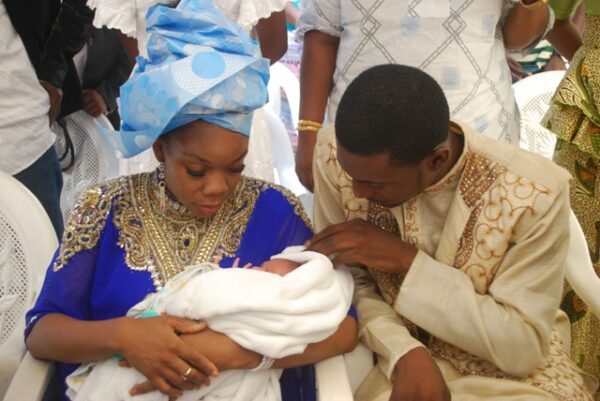
Naming ceremonies have always been a vital cultural rite, symbolizing a child’s integration into a family, community, or religious group. While rooted deeply in tradition, the practice has evolved significantly in contemporary times. Modernization and technological advancements have reshaped this ancient rite of passage, blending heritage with new societal norms.
In many parts of Africa, traditional naming ceremonies remain significant but have adopted modern variations. For example, in Ghana, a newborn is typically introduced to the community on the eighth day after birth in a ritual called “outdooring.” Traditionally, this ceremony involved spiritual blessings from a priest, who would bestow the name chosen by the parents.
One profound act during this ceremony is when the priest dips a finger into water and smears it on the child’s lips, followed by the same with liquor or wine. This gesture symbolizes truthfulness and honesty, teaching the child to grow with integrity, letting their “yes” mean yes and their “no” mean no. In some communities, the ritual extends to the child tasting a drop of animal blood or bile, symbolizing resilience and strength.
However, modernization is gradually transforming these practices. Today, in Christian households, a pastor often leads the ceremony, offering prayers for the child and officially pronouncing their name. The name is repeated three times, affirming it as the child’s identity for life.
Why the Delay in Naming?
The tradition of waiting several days before naming a child has deep cultural and spiritual roots. In some West African tribal communities, it is believed that newborns are initially visitors from the spirit world. If a child survives the first eight days, it signifies that the gods have permitted the child to stay in the human realm, warranting a name that severs any ties to the spiritual world.
Other communities prioritize health concerns, believing that a newborn is too vulnerable to be exposed to large gatherings immediately after birth. For many families, it is simply a tradition passed down through generations, though the deeper meaning may have been lost over time.

Ghana’s Unique Naming Tradition
Ghanaian culture stands out with its unique practice of naming children based on the day of the week they are born. This tradition gives every individual an additional name that carries cultural and spiritual significance. For instance:
- Monday: A boy is called Kojo and a girl Adwoa.
- Tuesday: A boy is Kwabena, and a girl is Abena.
- Wednesday: A boy is Kweku/Kwaku, and a girl is Akua.
These names are often accompanied by appellations tied to the child’s ancestral tribe, adding layers of meaning and identity.
In Western cultures, the naming ceremony is typically referred to as “baptism” or “christening,” especially within Christian communities. While the rituals differ from African traditions, they share a common purpose, welcoming the child and solidifying their identity within a spiritual or familial framework.
Some argue that a naming ceremony is unnecessary since a child is already registered at birth with an official name. However, many families see the event as an opportunity to formally introduce the child to the community while celebrating this life milestone with loved ones.
Modern Trends in Naming
The pursuit of uniqueness and creativity in naming has become more prominent in contemporary times. Parents are increasingly adopting unisex names, which were less common in previous centuries. Additionally, name merging, a practice where parents combine parts of their names to create a unique moniker, has gained popularity.
While these modern names may lack traditional meanings, they reflect individuality and the evolving nature of naming practices.
Whether rooted in tradition or shaped by modern trends, naming ceremonies remain an incredible rite of passage. Beyond introducing a child to the world, these ceremonies offer a moment for families and communities to come together, celebrating life, culture, and identity.
Your biggest book lover,
Tiana Diaga.





